-
3 Broadband Video Snippets to End the Week
Closing out another busy week, here are 3 diverse broadband video snippets that hit my radar in the past few days:
1. YouTube Drives the Political Newscycle
Back in December, in 6 Predictions for 2008, I suggested that "2008 is the year of the broadband presidential election." This seems to become more evident with each passing week. I find that particularly when watching cable news, YouTube's influence just keeps on growing.
For example, I'm a fan of "AC360" on CNN, which I try to catch at 10pm each night. This week the show was constantly replaying the YouTube videos of Rev. Jeremiah Wright that have dogged the Obama campaign. Conversely, a few weeks ago, Obama got a great tailwind from the massive attention paid to the viral "Yes We Can" music video sensation by will.i.am. That of course was on top of the earlier "Obama Girl" phenomenon. Separately, the McCain campaign just yesterday fired a campaign worker for posting a controversial video on YouTube about Obama and race. This too was covered on AC360 last night. Then of course there were the YouTube co-sponsored debates, offering video-based questions that were constantly replayed afterward.
The point of all this is that broadband video has turned election coverage upside down, making it incredibly hard for candidates to control the political newscycle. The "democratizing" effect of YouTube means that on any given day, at any given moment, something may get posted which diverts the campaign's attention. And with major media outlets paying such close attention to YouTube, everything is immediately amplified. Not since the early 1960s when TV began influencing presidential politics have we seen a new medium have such a profound impact on an election. And we still have 8 months to go until November...who knows what's yet to come!
2. SI Vault is Addictive
On to something more fun, if you haven't yet checked out Sports Illustrated's new "SI Vault" site just launched this week, I suggest you do. It's a highly addictive trip down memory lane. SI has digitized all of its assets and also made available non-SI content, all in one easy-to-use location powered by Truveo. Focusing on video, I found Franco Harris's "Immaculate Reception" from the 1972 Steelers-Raiders playoff game and also Doug Flutie's famous "Hail Mary" pass to beat Miami in 1984. I could have spent hours at the site, although it's not perfect. I tried finding Tom Watson's 1982 U.S. Open chip-in at Pebble Beach to beat Jack Nicklaus, but alas no results were found. Obviously all this stuff is available elsewhere online, but SI Vault creates a great context for sports fans to enjoy themselves, wrapping SI and non-SI content together in one nice package.
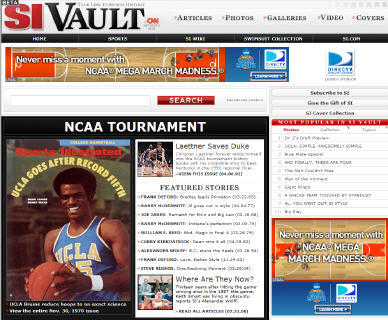
3. Apple's Roadblocks are Baaaack
And for even more fun, I encourage you to check out WSJ.com and NYTimes.com today. Apple is "roadblocking" the home pages of both again with a new Mac vs. PC ad, as they did back on Jan. 17th. This means that Apple has bought out all the home page leaderboard inventory on these 2 sites, so every time a visitor comes today, they see the same Apple ad. With all the talk about broadband video advertising, pre-rolls, overlays, etc, Apple again shows with its roadblocks how a little bit of creativity with rich media ad units can go a really long way. The ads are a great mix of interruption and opt-in and are no doubt highly effective branding units for Apple. Have a look and enjoy.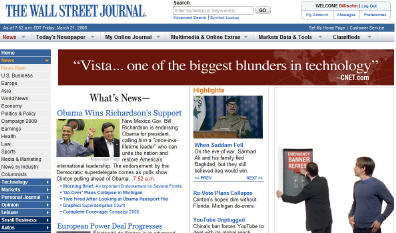
Categories: Brand Marketing, Cable Networks, Politics, Predictions, Sports, UGC, Video Sharing
Topics: Apple, Barack Obama, CNN, NYTimes.com, Sports Illustrated, Truveo, WSJ.com
-
Last Super Bowl Post - I Promise
I promise, this will be my last post on the Super Bowl ads. I suspect some of you are getting sick of hearing about them, but the reality is that there are some cool follow up tidbits emerging that I think many of you will be interested in.

First a clarification. I accidently omitted mentioning Audi as another Super Bowl advertiser that had a broadband component to their ad. Their mention of "TruthInEngineering" at the end of their spot was so quick that I didn't even notice it. That's a shame, because when you visit the mini-site there's a lot of great video, including one lasting 3 minutes all about the making of the ad.
Ken Liebeskind has a good interview with Paul Venables, who is the founder and co-creative director of the ad agency that created the spot and the videos at the mini-site. I really like how well developed the whole "Truth In" concept has been executed in the mini-site. My only gripe with the execution of the TV spot is that just flashing "Truthinengineering.com" at the end for a quick second is insufficient to really optimize traffic flow. Though Venables says traffic is way up since the game, I think it would be far higher had they focused on the URL longer.
Meanwhile, some interesting follow up stats that have bubbled up. comScore is reporting that 13% of Super Bowl viewers watched an ad online and that 13% visited an advertiser's web site. Of those who visited an advertiser's web site, 38% visited GoDaddy.com, 22% Coca-Cola and 21% Pepsi.
YouTube's AdBlitz Gallery provides the number of views for all the ads. The top 5 list is currently: SoBe LifeWater/Thrillicious (740,094),
Derek Jeter/G2 (677,686), Bridgestone/Scream (564,986), ETrade/Talking Baby (530,397) and CareerBuilder/Queen of Hearts (442,273).Lastly, the Cincinnati Enquirer is reporting that MyTalkingStain.com, the mini-site TideToGo promoted, had received 30,000 visits by the end of Sun night and already had 5,500 customized ads created. The UGC contest at the site invites users to create their own spoof of the Super Bowl ad. In my opinion, Tide To Go gets top honors for making all the right moves: A clever game spot. Great promotion to the mini-site. Great engagement opportunities and payoffs for consumers. I think it's a model for future Super Bowl advertisers to follow.
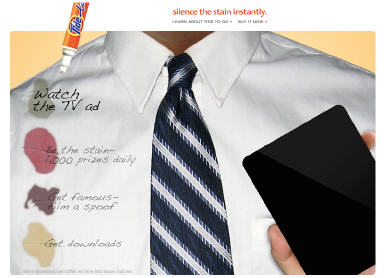
Ok, that's it. Now I'll shut up about Super Bowl ads, until 2009.
Categories: Brand Marketing, Sports
Topics: Bridgestone, CareerBuilder, Coca-Cola, ETrade, G2, GoDaddy, Pepsi, SoBe LifeWater, YouTube
-
A Little More Super Bowl Fun
OK, today no rant, just one more little insight to offer from Super Bowl ads.
Yesterday I highlighted the 5 ads (out of the total 52) which had a broadband component. They were:
GoDaddy - promoting Danica Patrick's "Exposure" banned ad and other videos
TideToGo - promoting "MyTalkingStain.com" a fun microsite
SoBe LifeWater - promoting "Thrillicious.com" a microsite where 2 more spots with the dancing lizards can be seen
Sunsilk - promoting "LifeCantWait.com", a microsite with a UGC contest which is not yet active
Pepsi - promoting "PepsiStuff.com", where users can download videos and music
I'm able to track click-throughs to each link I share in these emails. I thought you might be interested to see a graph of these clicks from yesterday. Note they're shown as an index, not actual numbers, with a starting index value of 100 for Sunsilk.
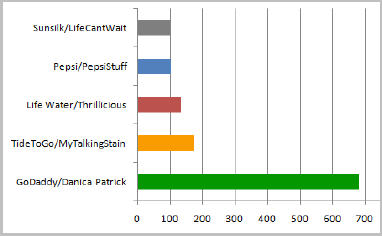
As you can see, VideoNuze email recipients expressed a pretty strong interest in the GoDaddy.com Danica Patrick ad. I'm sure many of you are not surprised since it has a pretty overt potential payoff for visitors.
Though the specifics of that payoff (is Danica actually going to remove her jacket and expose herself?) are very enticing, I think the larger issue to pay attention to is: how can advertisers explicitly use suspense, uncertainty and payoff to drive audiences to do something? Here's the last frame of the Danica spot:

To make this more tangible, consider this: The SoBe LifeWater ad was easily the most impressive use of special effects of all the Super Bowl ads. No doubt the SoBe LifeWater folks spent heavily making the ad, and then paying supermodel Naomi Campbell to dance with the pack of lizards to Michael Jackson's "Thriller." It certainly qualifies as the kind of thing that people would be interested in seeing more of, had SoBe LifeWater teased fans the right way at the end of the ad.
But they didn't. Instead, they simply flashed the URL "Thrillicios.com" at the end of the spot. Nothing was said about what to expect there, why you should go there, what surprises were in store, etc. (In fact there are 2 very funny and clever "episodes". And by the way, does this imply a new Life Water iguana series? Who knows?). Here's the last frame of the SoBe spot:
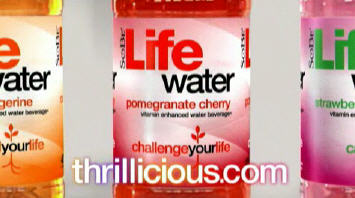
The point is this: I think SoBe LifeWater missed a huge opportunity to keep viewers engaged, which would have both improved the ROI on their Super Bowl ad spend, and also deepened viewers' engagement with the brand. While the Campbell spot was hugely entertaining, it did little to power ongoing engagement. Contrast this with GoDaddy, which no doubt had people pouring into its web site since the spot ran, with ongoing chatter and brand-building taking place.
As I said yesterday, advertisers need to understand how to use broadband video to evolve Super Bowl ads from having big-time entertainment value to having big-time engagement value. Some like GoDaddy get this, while many others, like SoBe LifeWater, are still on the learning curve.
What do you think? Post a comment and let us know!Addendum - I missed this piece in AdAge "GoDaddy Super Bowl Spot Sets Web-Traffic Record." The "Exposure" on-air ad drove 2 million visits to the site, during the game alone, a record for GoDaddy since it began advertising on the Super Bowl. And no doubt a multiple of that since the game ended. More evidence that GoDaddy nailed it big-time.Categories: Brand Marketing, Sports
Topics: GoDaddy, Life Water, Pepsi, Sunsilk, Super Bowl, TideToGo
-
My Rant About Super Bowl Ads
I love the Super Bowl ads as much as anyone. I never stop being amazed by the creativity and humor on display during each year's big game. This year was no exception: screeching squirrels, a strutting heart,
 shrunken heads, talking babies, the list goes on. For what Super Bowls ads are and always have been, they're terrific. My problem is that I believe broadband video allows Super Bowl ads to be much more than what they are and always have been. But the agency world does not seem to be getting this message.
shrunken heads, talking babies, the list goes on. For what Super Bowls ads are and always have been, they're terrific. My problem is that I believe broadband video allows Super Bowl ads to be much more than what they are and always have been. But the agency world does not seem to be getting this message.Two years ago I wrote "The Ten Million Dollar Super Bowl Ad?", where I outlined a scenario under which a 30 second spot could someday go for ten million bucks. How? By combining the best of brand advertising (the big emotional play) with the best of online advertising (the big measurable, performance-oriented play).
I wrote in that post: "What I envision is that the 30-second spot during the game will become the viewer's introduction or re-introduction to the brand or product. Numerous online, broadband-centric tactics will follow, with video being the center of the action. In football terms, the 30-second spot will morph from throwing a long pass (which is accompanied by high drama, but low probability of an actual score) to executing a more consistent ground game (accompanied by lower drama, but a much higher probability of an actual score). With this added measurability and a direct feedback loop, marketers will have much less anxiety about whether to ante up for the big game (and therefore the price will spiral upward).
I thought agencies and marketers would see this light and rush toward it. Boy was I over-optimistic. After watching all 52 Super Bowl ads this morning (thanks AOL), I am completely dismayed to report that, by my count, only 5 ads had any broadband video component:
GoDaddy - promoting Danica Patrick's "Exposure" banned ad and other videos
TideToGo - promoting "MyTalkingStain.com" a fun microsite
Life Water - promoting "Thrillicious.com" a microsite with a 2nd spot with the dancing iguanas
Sunsilk - promoting "LifeCantWait.com", a microsite with a UGC contest which is not yet active
Pepsi - promoting "PepsiStuff.com", with Amazon (ok, more focused on music than video)
All of the other 47 ads, representing tens of millions of dollars of clients' money, followed the same game plan from Super Bowls' past: go for either the clever, the funny or the gross, in an attempt to create buzz and fond memories for fans.
For me, this hidebound behavior showcases agencies at their most disappointing: unable to break out of the box, recognize new consumer engagement opportunities for their clients or embrace new technologies. Their inability or unwillingness to be more progressive is at the heart of why the whole advertising industry is in such chaos, with an increasing share of total spending shifting to online each year.
Nonetheless, I remain a long-term optimist. Maybe I'm crazy, but I'm still betting that someday, somehow, more agencies and brands will wake up and realize what the 5 brands above did this year: the combination of on-air and broadband is how to score a touchdown.
What do you think? Post a comment and let us all know!
Categories: Advertising, Sports
Topics: GoDaddy, Life Water, Pepsi, Sunsilk, Super Bowl, TideToGo
-
CES 2008 Broadband Video-Related News Wrap-up
CES 2008 broadband video-related news wrap-up:
Panasonic and Comcast Announce Products With tru2way™ Technology
Panasonic And Comcast Debut AnyPlay™ Portable DVR
NETGEAR® Joins BitTorrent™ Device PartnersD-Link Joins BitTorrent™ Device Partners
Vudu Expand High Definition Content Available Through On-Demand Service
Sling Media Unveils Top-of-Line Slingbox PRO-HD
Open Internet Television: A Letter to the Consumer Electronics Industry
Paid downloads a thing of the past
Samsung, Vongo Partner To Offer Movie Downloads For P2 Portable Player
Comcast Interactive Media Launches Fancast.com
New Year Brings Hot New Shows and Longtime Favorites to FLO TV
P2Ps and ISPs team to tame file-sharing traffic
ClipBlast Releases OpenSocial API
Categories: Advertising, Aggregators, Broadband ISPs, Broadcasters, Cable Networks, Cable TV Operators, Devices, Downloads, FIlms, Games, HD, Mobile Video, P2P, Partnerships, Sports, Technology, UGC, Video Search, Video Sharing
Topics: ABC, BitTorrent, BT, Comcast, D-Link, Disney, Google, HP, Microsoft, NBC, Netgear, Panasonic, Samsung, Sony, TiVo, XBox, YouTube
-
Microsoft Flexes Broadband Muscles at CES
Microsoft grabbed the early PR spotlight at the Consumer Electronics Show (CES), now underway in Las Vegas, announcing a variety of deals across the broadband video spectrum. The deals, announced by Bill Gates in his traditional night 1 keynote, reinforce Microsoft's intentions to play multiple roles in what Gates calls the "first true Digital Decade."
Here's a look at Microsoft's deals and why they matter:
NBCU 2008 Olympics on MSN, using Silverlight
Microsoft and NBC, which has the broadcast rights to the '08 Summer Games from Beijing, announced that MSN would be the exclusive partner for NBCOlympics.com including thousands of hours of live video
 coverage, and that Silverlight, which is Microsoft's "Flash-killer", would be used. As I mentioned in my "6 Predictions for 2008", the '08 games are going to be the biggest broadband video event yet. The deal gains MSN lots of traffic and Silverlight lots of exposure and downloads, not to mention serious validation as a live streaming platform if it executes well.
coverage, and that Silverlight, which is Microsoft's "Flash-killer", would be used. As I mentioned in my "6 Predictions for 2008", the '08 games are going to be the biggest broadband video event yet. The deal gains MSN lots of traffic and Silverlight lots of exposure and downloads, not to mention serious validation as a live streaming platform if it executes well.ABC/Disney and MGM content on XBox LIVE
In a further move to bolster the premium-quality content available in XBox LIVE (the content offering that accompanies XBox 360), Microsoft announced that both ABC/Disney and MGM would now be providing both SD and HD content. These moves bring XBox LIVE's catalog closer to parity with iTunes, while
 keeping up the competition with Amazon Unbox and other stores. Separately, Microsoft said that XBox racked up 17.7 million units sold during the '07 holiday season.(correction, Microsoft press release misstated this number. Holiday sales were actually 4.3 million units, bringing cumulative units sold to date to 17.7 million, thx Karl)
keeping up the competition with Amazon Unbox and other stores. Separately, Microsoft said that XBox racked up 17.7 million units sold during the '07 holiday season.(correction, Microsoft press release misstated this number. Holiday sales were actually 4.3 million units, bringing cumulative units sold to date to 17.7 million, thx Karl)XBox users have been remarkable active purchasers and downloaders using XBox LIVE, and previous briefings I've conducted with XBox executives suggest that the initiative has been particularly successful with HD. Since Xbox is purchased primarily as a gaming platform, it serves as a great Trojan horse opportunity for Microsoft to gain broadband access to the TV.
 Meanwhile, XBox LIVE has served as the deal unit for Zune's library as well, so these moves are important to watch as they benefit Microsoft's efforts to dislodge iPod from its perch as the leading digital media player. Only disappointment here is no ad-supported counterpart was announced for ABC programs, leaving AOL as ABC's only announced broadband syndication partner, as best I can tell.
Meanwhile, XBox LIVE has served as the deal unit for Zune's library as well, so these moves are important to watch as they benefit Microsoft's efforts to dislodge iPod from its perch as the leading digital media player. Only disappointment here is no ad-supported counterpart was announced for ABC programs, leaving AOL as ABC's only announced broadband syndication partner, as best I can tell.BT and XBox 360 Integration
Microsoft leveraged Xbox 360 for another convergence play, announcing with BT that the company's "BT Vision" IPTV service would be available for XBox 360 owners as an integrated service offering. This means that no separate set-top box would be required for BT Vision subs. Though the box won't roll out until mid '08, this concept has compelling upside for both sides and could be a nice blueprint for future IPTV deals. It eliminates set-top capex for BT, while providing strong marketing benefits to both parties, helping drive broadband/TV convergence on the back of the popular XBox gaming console.
Showtime, TNT and CNN with new apps on Mediaroom, Samsung supporting Extender
Elsewhere, Microsoft announced that Showtime, TNT and CNN would be creating new apps for Microsoft's Mediaroom IPTV platform, which it says is now installed on 1M set-tops globally. And lastly, that Samsung will support Extender for Windows Media Center, which means that HD content can be sent over wired or wireless-N networks from PC to TV. Extender hasn't caught on yet, but Microsoft is continuing to push it as a bridge device. I've yet to test it, but have that on my list of to-do's.
Taken together, these announcements from Microsoft show the company's vast resources allow it to play a role in all aspects of the broadband era - software, devices, services, content, gaming, etc. Less pronounced in these deals was the company's recently added online advertising prowess, which will soon be applied to broadband video as well. Stay tuned for news on this front as '08 unfolds.
Categories: Aggregators, Broadcasters, Cable Networks, Downloads, FIlms, Games, HD, International, IPTV, Partnerships, Sports
Topics: ABC, BT, CNN, Disney, MGM, Microsoft, NBC, Olympics, Samsung, Showtime, TNT, Xbox 360, Xbox LIVE
-
6 Predictions for 2008
With 2007 wrapping up, it's time to look ahead to the new year and make 6 predictions about what's ahead for broadband video in 2008. In general, I'm extremely optimistic about broadband's potential in the new year. To be sure, there are lots of challenges ahead, but much to look forward to.
Here's what my crystal ball is telling me:
1. Advertising business model gains further momentum.
Many of you have been hearing me beat this drum for a long time now; I'm just going to go right on beating it in 2008. Advertising is the primary business model for broadband video and this will only continue to grow in importance as the year goes along.
All the elements are falling in place for the ad model's momentum. In '08 we'll see more video consumption, especially of high-quality video, and more syndication, all of which will lead to more ad inventory. But 2008 is about more than just a quality and volume; it's also about better targeting, better formats, more sophisticated sales processes and more interactivity/community building around video. I'm impressed with the range of companies pursuing each of these areas and expect them to gain lots of traction.
2. Brand marketers jump on broadband bandwagon.
2007 marked the continuation of brand marketers creating their own broadband video-centric destinations, wrapped in increasingly clever campaigns. I track these initiatives very closely and wrote about many of them (Dell and Gap, Frito-Lay, Neiman-Marcus, Smirnoff, Dove, CIT, Campari, Universal Pictures, Showtime, etc.).
In 2008, we're going to see a proliferation of these direct-to-consumer broadband-centric marketing campaigns. Marketers and agencies across the board are coming to recognize how important broadband is for engaging their audiences in a way that TV spots simply can't match. Then factor in the high cost of TV and the rampant use of DVRs to ad-skip. I'm expecting lots of creativity from brand marketers in '08 as they push deeper into broadband, further pressuring the traditional TV ad business.
3. Beijing Summer Olympics is a broadband blowout.
NBC plans to stream an unprecedented 2,200 hours of live Olympics coverage at NBCOlympics.com. All of this is going to completely redefine how broadband adds new value to live sporting events. In particular, NBC's coverage is going to shine a very bright light on the appeal of broadband to deliver multiple simultaneous events in their entirety as they occur, instead of the usual chockablock, tape-delayed coverage. It's also going to demonstrate how well-suited broadband delivery is for niche but passionate audiences.
If NBC executes well, I think it has the potential to open up a whole new horizon in how broadband can augment (and in some cases, maybe even replace) broadcast coverage of sports events. For example, golf is a sport that cries out for improved coverage that broadband can offer. Instead of cutting back and forth to players' key shots, broadband would allow for cameras to stream all players' full rounds simultaneously, with fans able to watch just their favorite player, while also keeping an eye on the main feed. Bottom line, the '08 Olympics is going to show sports and live events producers everywhere what broadband can offer them too.
4. 2008 is the "Year of the broadband presidential election."
What TV was to the 1960 presidential campaign is what broadband is going to be to the '08 campaign. Broadband's impact has already been felt. Virginia Gov. George Allen's campaign was aborted after he was caught uttering a racial slur in his classic "YouTube moment." CNN has already hosted joint debates with YouTube. Hillary Clinton announced her candidacy in a video posted on her web site and also just launched TheHillaryIKnow.com with a passel of video testimonials about her softer side. Barack Obama's web site brims with video from the trail.
In '08 broadband video will be interweaved into the fabric of the major candidates' campaigns. It won't be an augment, it will be a central feature for reaching voters, particularly young ones. Broadband offers an unprecedented inexpensive way to convey the candidates' emotions and connect with voters. Presidential campaigning will never be the same again.
5. WGA strike fuels broadband video proliferation.
As the writers' strike slogs on, it is inevitable that many writers and producers (especially below the top tier) are going to look upon broadband as an attractive new medium to ply their trade. The signs are already there. It will be an ironic twist that the strike, which is centered on reallocating "new media" revenues, is going to stoke more interest in broadband productions, but outside the traditional apparatus.
I can't put my finger on exactly how this is going to unfold, but I think I can say with confidence that there is a lot of smart money eager to place bets on broadband video content. Writers and producers with track records and plausible plans will get funded. Quarterlife, Next New Networks, FunnyOrDie are all pre-strike examples of this. The strike only accelerates things.
6. Broadband consumption remains on computers, but HD delivery proliferates.
I wrote about this in detail just last week: regrettably broadband video is NOT coming to the masses' TVs any time soon. My guess is that 99.9% of users who start the year watching broadband video on their computers (or mobile devices in some cases) will end the year no closer to watching broadband on their TVs. Some initiatives will gain some ground, but on the whole, don't expect any mass adoption of devices or mechanisms to converge broadband with TVs in '08.
Nonetheless, do expect that HD or near HD-quality broadband video is going to proliferate in '08. A survey I worked on with a client, whose results will be shared in early '08, will attest to strong content provider interest in HD broadband video. That means that viewer experiences are only going to improve, and for those with big monitors and/or easy chairs, it may actually start to feel like this whole connect-the-computer-to-the-TV is unnecessary anyway.
So there you have it. Post a comment and let me know if you agree or disagree!
Categories: Advertising, Brand Marketing, Indie Video, Predictions, Sports, Video Sharing
-
NFL Demonstrates Syndication is Not Right for Everyone
As many of you know, in general I'm a big-time advocate of syndication as a strategy to permeate broadband video into all the "nooks and crannies" of the Internet. Many content providers have embraced this path, most recently Hulu and CBS (with its Audience Network). The purpose of syndication is to ensure that content reaches users where they currently visit, as opposed to requiring them to come to a new destination. That "destination-centric" approach was of course the way the traditional media industry worked.
But the NFL shows that syndication isn't right for everyone. In instances where there is genuinely unique content, it can make sense to pursue a pure destination strategy.

To illustrate, yesterday I missed part of the Patriots-Colts game. Though I did catch the end, I was eager to see the big plays. During the parts of the game I saw there were several promos for video available at NFL.com. So post-game I started pinging the NFL's site and it turned out that within about 1 1/2 hours of the end of the game, there was a 5:13 edited montage posted. It included most of the big plays and was available exclusively at NFL.com.
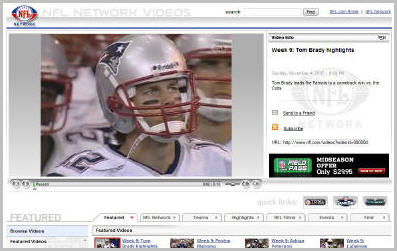
The NFL caused a kerfuffle earlier this year when it issued highly restrictive rules governing use of and monetization of its game video. But having had this experience, I think they made the right call. When you have must-see content and own all the rights, I think it is indeed better to pursue a destination strategy. You get all the views. You get all the monetization. You get all the site loyalty and cross-promotion opportunities. You get everyone linking to you. And you have the exclusive archive.
It's rare to own something as valuable as NFL game video. But if your video does have similar attributes, then I would encourage considering destination over syndication. If you go this route though, being highly proactive to serve users' interests, as the NFL is doing, is essential to success.
Categories: Sports
-
Sox Sweep
 Ok, no gloating, but hey, maybe time to spell D-Y-N-A-S-T-Y?
Ok, no gloating, but hey, maybe time to spell D-Y-N-A-S-T-Y?Categories: Sports
Topics: Boston Red Sox
-
Red Sox Triumphant, Celebration Continues at FoxSports.com
Ok, pardon me for a minor diversion from the all-important subject of broadband video.

But up here in New England, in Red Sox Nation, there's no more important priority. We're all sleepy but exuberant after our awesome Sox came back from being down 3 games to 1 to crush the Indians 11-2 last night. Next stop Colorado. Hey, Sox in the Series, Patriots 7-0 and by the way it's going to be 79 degrees on Monday. Alright, enough gloating.
And just to prove that everything comes back to broadband, credit to FoxSports.com for its post game show that continued the celebration after the game. For fans the opportunity to see the player interviews, catch the replays and just bask in the glorious win, FoxSports.com delivered a great package.
Now back to business.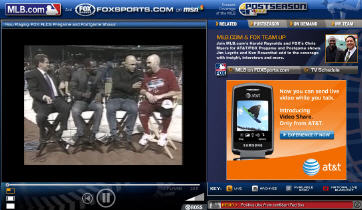
Categories: Sports
Topics: Boston Red Sox, FoxSports.com
-
WCSN: Succeeding With the Long Tail of Sports
 Yesterday's news that World Championship Sports Network (WCSN) has sold a majority interest to Leo Hindery's InterMedia Partners shows that the company's success in aggregating the Long Tail of sports is succeeding. In addition, it shows there are slivers of success in paid subscription models. To be sure, WSCN also sells plenty of ads, but the core of the company's model is its $4.95/mo or $49.95/year subscriptions.
Yesterday's news that World Championship Sports Network (WCSN) has sold a majority interest to Leo Hindery's InterMedia Partners shows that the company's success in aggregating the Long Tail of sports is succeeding. In addition, it shows there are slivers of success in paid subscription models. To be sure, WSCN also sells plenty of ads, but the core of the company's model is its $4.95/mo or $49.95/year subscriptions. Hindery, who in his past life headed former #1 cable operator TCI, knows from TCI's old Liberty Media affiliate, as much as anyone about creating programming value, and this move should certainly be read as a major endorsement of WCSN's strategy. The company has come a long way quickly, I recall speaking to CEO Claude Ruibal about 18 months ago when he was first fleshing out his distribution strategy. Kudos to him and his team for doing deals with many of the majors (MSN, AOL, Yahoo, FoxSports, ESPN.com, etc.) and no doubt driving dramatic traffic gains.
For those not familiar with WCSN, their model has focused on aggregating exclusive Internet rights from key Olympics sports associations, whose sports are generally not well-covered on broadcast or cable TV.
WCSN has been remarkably successful in aggregating these rights. The site lists at least 20 association partners and says "WCSN’s sports coverage includes over 200 live annual events, offering more 2,000 hours of annual original event programming and more than 10,000 hours of archival programming..." One can only imagine the frequent flyer miles that have been racked up by WCSN executives getting these deals done.
WCSN’s sports coverage includes over 200 live annual events, offering more 2,000 hours of annual original event programming and more than 10,000 hours of archival programming..." One can only imagine the frequent flyer miles that have been racked up by WCSN executives getting these deals done.
A key lesson to WCSN's subscription success is the incredible allure of sports programming. No matter how niche, there seems to always an audience of rabid fans. And their willingness to pay for coverage is insatiable. Now it looks like WCSN is going to ramp up its ad sales as well. In doing the spade work to aggregate this long list broadband rights with clear monetization opportunities, WCSN has created substantial value. No doubt as the business continues to grow it will be an attractive acquisition candidate. If I had to bet, I'd expect an exit to ESPN, the sporting world's 800 pound gorilla, will be in the offing down the road.
Categories: Deals & Financings, Sports
Topics: InterMedia, WCSN
-
Ads On Top of Ads? It’s Super Bowl Mania
OK, even as the enthusiast that I am about the value of Super Bowl ads increasing, this seems over the top to me. WSJ is reporting that a number of sites are selling pre-rolls on their Super Bowl ad galleries. Call me skeptical, but I just don't see how consumers are going to stomach this.
Categories: Brand Marketing, Sports
Topics: Super Bowl
-
On the Road to the $10 Million Super Bowl Ad
In February of 2006, following Super Bowl XL, I wrote a newsletter entitled, "The $10 Million Super Bowl Ad?". I suggested that despite all the anxieties around the future of the 30-second spot, the future of Super Bowl ads was very bright. This was the case because of all the broadband and online opportunities that can lead into and follow up the 30 second ad that shows during the game.
My proposition was that marketers would be less concerned about "throwing the long ball", i.e. spending $2.5 million per spot ($2.6 million for Super Bowl XLI, btw) if they were able to monetize that investment beyond just the on-air showing. And broadband is a great way of doing exactly that.
Today Stuart Elliott at the NY Times had a great piece, "Multiplying the Payoffs From A Super Bowl Spot", exactly on this point, and how it's playing out for Super Bowl XLI. It showcases the advertisers who are leveraging broadband this year, including Anheuser-Busch, GM and Garmin. I continue to forecast that broadband is only going to drive the price of 30 second Super Bowl spots (and in fact likely add new value to all :30s) higher as marketers come to understand how they can leverage their investments and tangibly drive revenues from them.
Categories: Brand Marketing, Sports
Topics: Super Bowl
Posts for 'Sports'
Previous |


